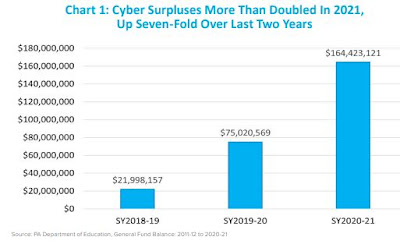Monday, February 6, 2023
Congressman Proposes Turning Title Funds Into Vouchers
Sunday, February 5, 2023
ICYMI: Arctic Blast Edition (2/5)
Inside a US Neo-Nazi Homeschool Network With Thousands of Members
I’m a teacher in Florida. Here’s what the DeSantis book bans look like in my classroom
Saturday, February 4, 2023
Bellwether's Big Book O'Data Worth A Look
Bellwether (formerly Bellwether Education Partners) is an education consulting firm, generally located petty solidly along the American Enterprise Institute-Thomas Fordham Institute axis of education reform. Their huge list of "partners" include those two thinky tanks, the CANs, Teach for America, the Broad Foundation, then 74, the Walton Foundation, American Federation for Children, and a host of other choicey reformster outfits. They have some Bain alumni, including co-founder Mary K. Wells, though co-founder Andrew Rotherham, external relations guy and voice of Eduwonk, is the person you more likely run across on line.
While there is no mistaking their particular bent, this outfit is less about lathered-up advocacy and more about actual facts than some of the brethren (looking at you, current version of Manhattan Institute). Rotherham is on my short list of People I'll Probably Disagree With But I Will Still Make It A Point To Read Them.
All of which is to lead up to my point, which is that Bellwether has put out a publication that is really worth reading.
Common Ground: How Public K-12 Schools Are Navigating Pandemic Disruptions and Political Trends, by Rotherham, Kelly Robson Foster, and Michael D. Corral is a one-hundred-and-page collection of information from a wide variety of sources. The stated goal is "to help the field separate signal from noise and provide context around various issues and trends affecting the sector." And the report delivers lots of information from diverse sources, a little bit of contextualizing, and no real attempt to dictate what should come next.
Our goal is to provide a clear fact base for discussion about complicated issues. It is not to suggest “right” answers on contested questions. We present a great deal of public opinion data not because we believe the majority position is axiomatically the correct one but rather because understanding the landscape is essential. Reasonable people can and will disagree about the best remedies or policies for much of what we describe here. Instead, we seek to establish a common fact base on the premise that understanding the landscape is the first step toward successfully navigating it.Polling data shows that CRT panic was unaccompanied by CRT knowledge. One particular telling poll shows that people support CRT as long as you don't call it CRT. And the writers are clear about the problems caused by anti-CRT laws that are vague and difficult to enforce (though on this they do miss the role of giving the public the right to sue any school they think is being naughty).
They also offer some data to suggest that the disagreement is not as wide or deep as most people think it is, and that other issues are of greater concern.
Friday, February 3, 2023
AZ: How Do You Make School Grading Systems Worse
 |
| This guy |
Horne said his team is still developing a plan for how to best collect information on what schools are teaching and how to include that in the letter grade formula, he said.
Michelle Rhee Is Back
Michelle Rhee, the Kim Kardashian of education, the poster child for a decade of reformsterism, is back in action in the education entrepreneur space, and the White House has apparently welcomed her.
 |
| There's no way this could end badly |
First, a refresher course
If you're old enough to have memories of Rhee's salad days, you can skip this section. But in 2023, it's entirely possible that some folks will say, "Who?" So here's who.
The very fact that I don't really need to review her story makes part of my point. Rhee was the previous decade's best-known public face of education reform, culminating in that infamous Time cover of her holding a broom. Rhee was the quintessential reformster, a Teach for America product who had put in her time (including the apparently-hilarious incident in which she duct-taped student mouths shut). After her TFA stint, she started The New Teacher Project, a group that brought the TFA philosophy to older folks who had already had a job or two; TNTP morphed into another reformy thinky tank kibbitzing on topics from teacher evaluation to professional development. They made up something called the opportunity myth, but their big hit has been a position argument called "The Widget Effect" which argued that teachers should be paid, promoted, and fired based on student test scores.This, somehow, led to a job in 2007 as the Chancellor of DC Public Schools, Rhee's big breakout role win which she beat the crap out of teachers and administrators alike. Her triumphs were celebrated, her improvements touted as proof of concept for hard-hitting accountability and firing your way to excellence. Except that it turned out that most of her DC miracle was not so much miracle as good old-fashioned fudging and cheating.
And it came with big costs. George Parker, president of the Washington Teachers Union, said no other superintendent had wrecked morale more than Rhee. Interviewed by Marc Fisher in 2009 for the Washington Post, Parker pointed to some other issues as well:
Parker spells out what many older, black teachers told me right after demanding that I not publish their names: "I suppose it's not simply racial -- it could be culture. The chancellor said to me, 'Why do people feel they need [tenure] protection if they're doing their jobs?' And I said, 'A lot of our veteran teachers know better.' As African American teachers, they learned coming up that it didn't matter how good you were: Because you were black, you weren't treated fairly. That is the African American experience. And there could be a lack of understanding of the culture of the workforce."
Mayor Adrian Fenty tied his own political future to Rhee's school leadership, and in the 2010 election, the voters said "No, thank you." Rhee was out of a job, but in a true edu-celebrity move, took to Oprah to announce her next move: the launching of StudentsFirst. And not just a launch, but an audacious goal-- 1 million members would raise $1 billion dollars.
That was 2010, the dawn of the decade.
Rhee entered the decade as the quintessential reformster. She possessed no actual qualifications for the jobs she took on, had never even run a school, let alone a major urban district., She championed every reformy idea beloved at the time, from charters to test-based accountability to gutting teacher job protections and, as was the common back then, the notion that the real problem with schools was all the shitty teachers protected by their shitty unions.
Like many of the big names in education disruption in the oughts, Rhee skated on sheer chutzpah. There was no good reason for her to believe that she knew what the heck she was doing, but she was by-God certain that her outsider "expertise" was right and that all she needed to create success was the unbridled freedom to exert her will.
And in 2010, it was working. The media loved her and, more significantly, treated her like a go-to authority on all educational issues. They fell all over themselves to grab the privilege of printing the next glowing description of the empress's newest clothes. She was more than once packaged as the pro-reform counterpart of Diane Ravitch (though one thing that Rhee carefully and consistently avoided was any sort of head to head debate with actual education experts).
For the first part of the decade, it kept working. Students First became a powerhouse lobbying group, pushing hard for the end of teacher job protections. She was in 2011's reform agitprop film Waiting for Superman. LinkedIN dubbed her an expert influencer. She spoke out in favor of Common Core and related testing. A breathless and loving bio was published about her in 2011; in 2013 she published a book of her own. She had successfully parleyed her DC job into a national platform, and done it all as the prototypical pro-reform Democrat.
"At my prior tech company, we had trouble filling our tech roles, so we started an apprenticeship program. We realized that there were a lot of capable people out there who could be quickly and effectively trained to fill technology roles. Many of the team members who went through our program are now working at some of the top tech companies in the country like Google, Uber and Amazon, and others," said Ximena Hartsock, co-founder, BuildWithin. "It was this experience that inspired us to start BuildWithin and create an accelerated path to well-paid technology careers for individuals of any background, geography, demographic group or age. The beautiful thing is that our platform both solves a major talent problem for employers and creates access to new opportunities for job-seekers."
While not everyone has a degree, everyone has skills and potential. If given the right opportunities and training, anyone can achieve great things.
All of which explains how we arrived at the point that this popped up on my Twitter feed today:
We are excited to join the White House's efforts to expand apprenticeships across the country #Apprenticeship #FutureOfWork #BuildWithinhttps://t.co/a94YCyOWR9
— Michelle Rhee (@MichelleRhee) February 3, 2023
Thursday, February 2, 2023
GOP Proposes Federal School Voucher (Again)
Here we go again. It's a voucher bill-- the tax credit scholarship variety-- proposed in the House of Representatives.
H.R. 531 was introduced on January 26 by Rep. Adrian Smith (NE-3). Smith's story includes an episode where he was a child running a snow cone stand "and he realized at a young age what overly restrictive government policies can do to American businesses." He's a graduate of Liberty University, a member of the Tea Party Caucus, and an election denier.
 |
| I won't lie--getting tired going up and down these steps |
The bill has 26 co-sponsors, including Elise Stefanik, Jim Jordan, Virginia Foxx, and my representative, Mike Kelly.
We don't have a text for the bill yet, but we do have a title:
To amend the Internal Revenue Code of 1986 to allow a credit against tax for charitable donations to nonprofit organizations providing education scholarships to qualified elementary and secondary students."We must give parents and children every opportunity to pursue the education that is best for them and that puts them on the best path forward from day one," says Rep. Kelly, who also does not call for more funding for public ed and less discrimination in private ed.







